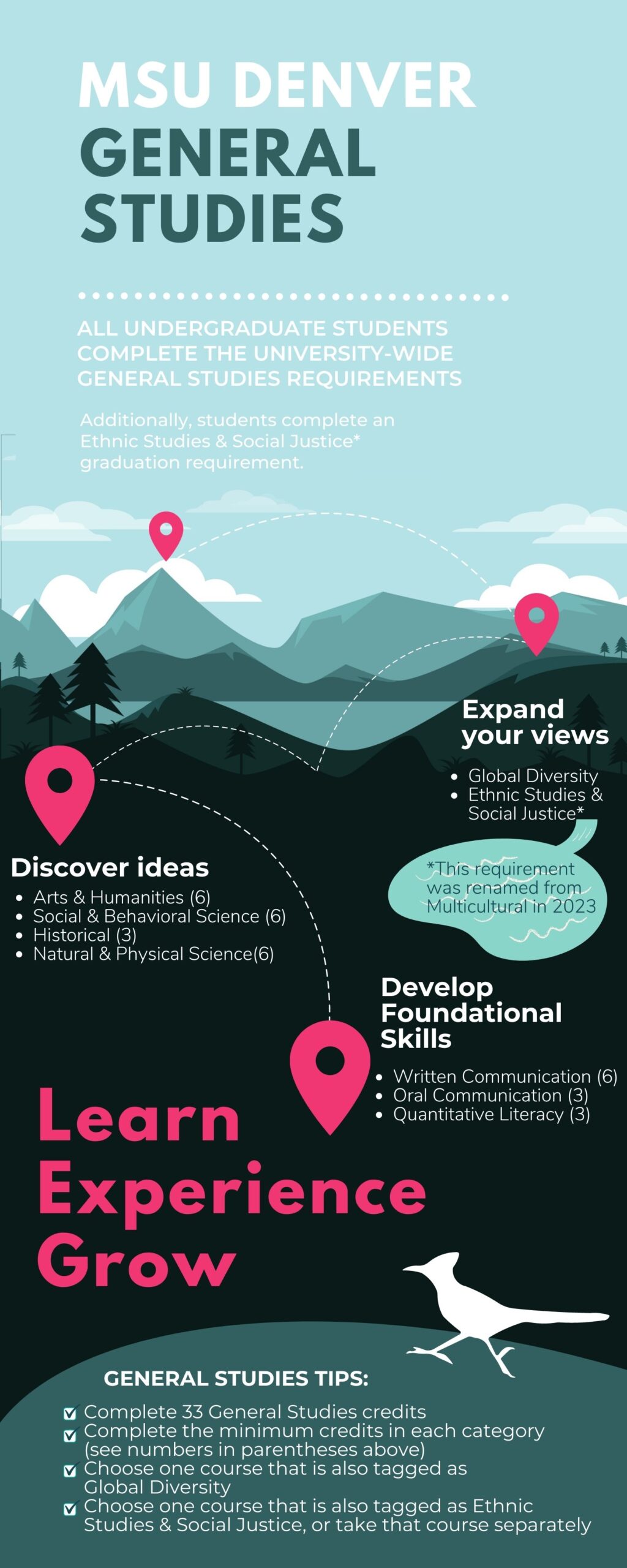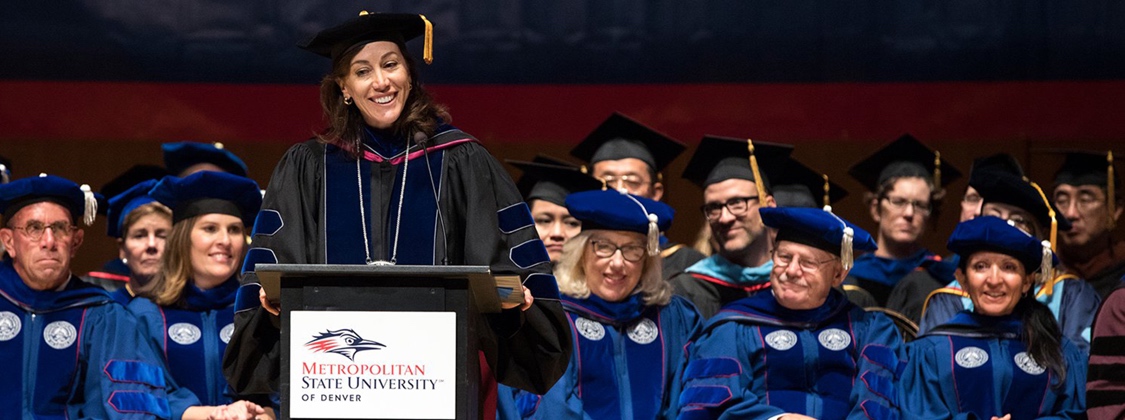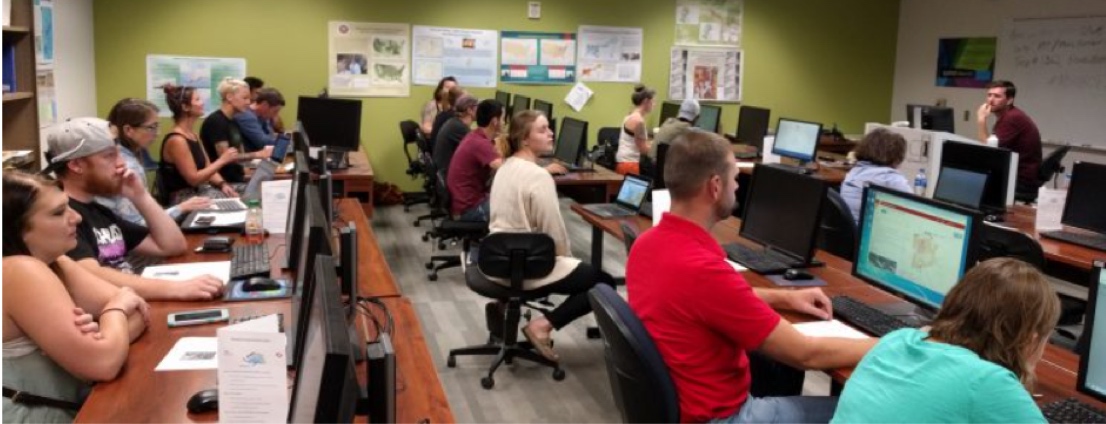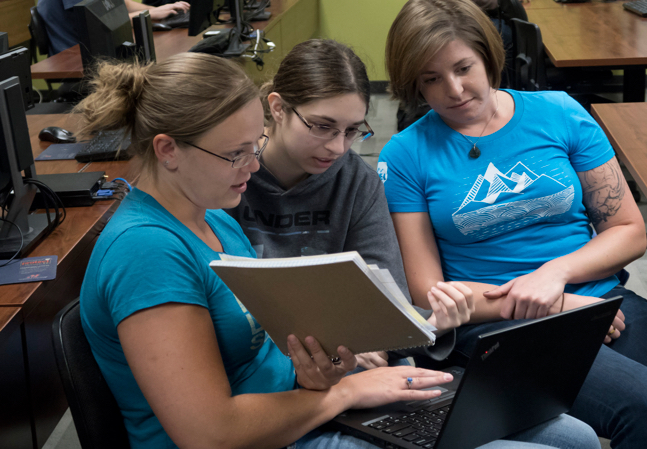General Studies Course List
Printable pdf

Learn about the General Studies program, a series of courses designed to accompany the coursework done in the major to create broadly skilled graduates who learn, experience, and grow.
| Category | Credits |
| Written Communication | 6 |
| Oral Communication | 3 |
| Quantitative Literacy | 3 |
| Arts and Humanities | 6 |
| Historical | 3 |
| Natural and Physical Sciences | 6 |
| Social and Behavioral Sciences | 6 |
| Global Diversity | 0 or 3* |
| TOTAL | 33 minimum |
*Students may fulfill the global diversity requirement by taking an approved course within one of the following categories: arts and humanities; historical; natural and physical sciences; or social and behavioral sciences.
Students also take a 3-credit Ethnic Studies & Social Justice (previously named Multicultural) course for a graduation requirement. Some courses may fulfill the Ethnic Studies & Social Justice graduation requirement AND a General Studies requirement.
MSU Denver values that you are an individual coming from a community or family who are also invested in your education. That means that your educational experiences, personal backgrounds, and reasons for choosing MSU Denver are not all alike, but we want to provide you all with an equal chance of success. MSU Denver General Studies courses are designed with your progression toward your chosen area of study in mind. Building, or even just firming, your foundations in skills and content will prepare you to learn, experience, and grow throughout your whole life.
All undergraduates at MSU Denver must complete the university-wide requirements, including General Studies and the Ethnic Studies & Social Justice requirement (previously named Multicultural), which provide a broad span of knowledge and skills, and create a foundation for the more focused, deep study that takes place in each major. Students will choose courses among eight General Studies categories and build their own personalized experience based on courses of interest.
Students develop foundational skills, discover ideas, and expand their views. These areas overlap, helping students integrate skills and knowledge throughout the General Studies program. The foundational skills are courses recommended in the first year because these skills will be utilized throughout the college experience.
The General Studies program provides the foundation for the Bachelor’s degree. Students develop thinking, reasoning, and communication skills while discovering new ideas and expanding their views. The coursework is designed to create the opportunity for learning across different disciplines and builds experiences for students as they grow into lifelong learners.
Transfer students may transfer in a variety of courses that can fulfill General Studies requirements, but the program is designed uniquely for MSU Denver students and students are encouraged to begin their coursework at MSU Denver. Similarly, most General Studies courses are guaranteed to transfer to other Colorado colleges and universities. Due to the variety of courses available, transfer students may choose to finish their general studies with upper level courses.
Employers are looking for flexible workers who have the broad skills to problem solve. The General Studies program is designed to create experiences that use critical thinking, as well as communication and collaboration skills, all leading to problem solving expertise. The wide range of knowledge acquired in the General Studies program prepares students to be adaptable in the ever-evolving 21st century work place.

The General Studies curriculum provides an opportunity for students to explore what they want to be and who they want to be as a member of society. The curriculum can help students pinpoint their talents and passion to help steer them into the major that is their best fit.

The faculty have intricately designed General Studies courses to fulfill both university level and General Studies level goals for all MSU Denver students. Each course has passed a rigorous curriculum approval process, undergoes regular measurement of effective student learning to be included in the General Studies program, and is aligned with the mission of the General Studies Program. Faculty are experts in their fields of study and have been trained specially to teach the students with diverse academic backgrounds taking General Studies courses. Faculty use learner-centered, active learning teaching methods in the General Studies courses that encourage student collaboration.
General Studies courses connect work in the discipline to contemporary societal issues. Faculty use the content of their discipline to demonstrate the critical and creative thinking and reasoning used to solve relevant problems. Faculty are challenged to efficiently address the answer to the questions, “If this were the last course a student would take in my field, what would I want them to understand about how we have arrived at how we know what we know?” and, “What skills are most relevant to my students’ future success?”

Written Communication (6 credits), Oral Communication (3 credits), Quantitative Literacy (3 credits)
Care about words. The ones you write and the ones you read are fundamental to your scholarly career and the world you make for yourself beyond the campus. Written communication is the development and expression of ideas in writing across many genres and styles. It includes understanding how writers may shape texts for their specific rhetorical situation. It includes multimodal composing and the creation of texts that combine words, images, and/or data. Written communication abilities develop through interactive and iterative experiences across the curriculum. Students take two courses (6 credits) meeting these goals.
If you have ever appreciated an instructional video or listened to a podcast, then you know the importance of effective communication. Learn to share ideas with confidence. You can think about how audience matters or explore languages of the world. Students learn to perform effective and ethical oral communication that is appropriate to diverse audiences, settings, media, and goals. Students take one course (3 credits) meeting these goals.
Math is its own language. It speaks with symbols. It gestures with shapes. It raises an eyebrow with numbers. You need to know its expressions and techniques to communicate across time space. Competency in quantitative literacy represents a student’s ability to use quantifiable information and mathematical analysis to make connections and draw conclusions. The main focus of each Quantitative Literacy course is the use of mathematical techniques and analysis, with problems from a broad spectrum of real-life and abstract settings requiring translation to and from mathematical forms. Students take one course (3 credits) meeting these goals.

“Discover Ideas” courses give breadth to the student’s knowledge and ways of problem solving.
Arts and Humanities (6 credits), Historical (3 credits), Social and Behavioral Science (6 credits), Natural and Physical Science (6 credits)
People have so many ways of expressing their values and experiences. Language, art, literature and religion are just a few ways in which the human experience can both be known and appreciated. Take the next step and understand the wide array artifacts in the contexts of their creation and practice. In Arts and Humanities courses students interpret, analyze, and create texts and other artistic works to deepen their understanding of the various contexts that shape the human experience and explore fundamental questions of identity, value, diversity, and meaning. Students take two courses (6 credits) meeting these goals.
You have probably taken a history class before, but have you learned how historical knowledge is generated? Dates, places, and people are only the beginning of a journey into the past. Finding your own sources, asking useful questions, seeing context, and communicating your fact-based answers to different types of audiences are all skills you can use. Historical thinking contextualizes the present by using a wide range of sources and methods to understand how people experienced the past. Students take one course (3 credits) meeting these goals.
How do we understand ideas from the past and the forces of the present that influence our choices and constraints? These courses will equip you to navigate complex social and global issues. Courses in Social and Behavioral Science study the behavior and actions of individuals, groups, and/or institutions using scientific methods and approaches. Social and Behavioral Science also develops a student’s ability to examine and influence those behaviors and actions between and among larger social, economic, political, and/or geographic contexts. Students take two courses (6 credits) meeting these goals. *Students on catalog years 2019 and older may take any course from the full, current Social and Behavioral Science General Studies list to fulfill their SBS I or SBS II requirements.
Science helps you see the world. The problems that you want to solve have answers in science. You will need to know the methods of science and the knowledge of the fields. The Natural and Physical Sciences involve discovering knowledge in natural or physical sciences, applying scientific thinking and reasoning, and critically thinking about the use of scientific information. Students take two courses (6 credits) meeting these goals.

“Expand Your Views” courses increase students’ awareness and appreciation of cultural diversity in the United States as well as interdependent global systems and their implications for people’s lives.
Ethnic Studies & Social Justice (1 course), Global Diversity (1 course); Both of these courses may be double-dip courses, in that they may also fulfill another requirement in General Studies.
Global Diversity refers to a student’s ability to critically analyze and engage complex, interconnected global systems (such as natural, physical, social, cultural, economic, or political) and their implications for individuals, groups, communities, or cultures. These courses will introduce students to various concepts toward valuing diversity and the importance of inclusivity. Students should seek to understand how their actions affect both local and global communities. Courses in this category must contain a majority of material from one or more regions or countries outside the U.S. Students take one course that meets these goals.
The Ethnic Studies & Social Justice requirement replaced the Multicultural requirement for students on the 2023-2024 catalog and onward. The course lists for both are the same. Please always use the most recent course list, as courses are tagged with the attribute at the time you take them.
Students may find this requirement abbreviated on lists as ESSJ.
Ethnic Studies is rooted in a social justice approach to studying historically marginalized communities of color. The Ethnic Studies & Social Justice graduation requirement is designed to equip students with the tools to challenge, understand, and contextualize the treatment of racially and ethnically marginalized groups in the United States. As a fluid and contested space, the United States has been a historically, geographically, and politically contingent region. These courses center the experiences of marginalized groups and examine the ways in which the existences and experiences of these groups have been historically shaped by oppression and systems of white supremacy. Ethnic Studies & Social Justice coursework interrogates relationships between power, privilege, and oppression. Students explore how power and privilege in the past and present maintain oppression. Additionally, course content examines the resilience, activism, and advocacy of racially and ethnically marginalized groups to counter oppression and systems of white supremacy. Students learn to recognize key moments of liberation and those movements that advance social justice for racially and ethnically marginalized groups. Course content and materials may also examine and interrogate the oppression of other groups whose marginalized identities have been racialized and who have been thus oppressed as racial or ethnic minorities.
Students take one course that meets these goals. Students may take a course that fulfills this requirement AND a General Studies requirement.

For lists of General Studies or Ethnic Studies & Social Justice courses, use the buttons at the top of this page. Look through the courses in each category before you make a decision. You might not know you are interested in a course or a subject until you see it. You might choose something that complements your major or challenges you to do something entirely different. General Studies are safe places to take intellectual leaps.
Once you have made your choices READ THE RULES for your catalog year. Some courses and majors have special rules and requirements. You don’t want to find out after you have taken a course that it won’t count for general studies. Some majors recommend certain General Studies courses. Checking your degree progress report and seeing an advisor are always good ideas.
The catalog uses the phrase “Timing of Completion” to explain when you should be done taking general studies courses. We don’t want you to have to learn things in your senior year that would have made your college experience much better if you had taken them in your freshman or sophomore year.
You need to take classes in these categories before your finish your first 30 college-level credit hours:
And you need to take your second written communication course before you reach 45 hours. You may be blocked from registering for more courses until you complete these requirements.
Have questions about transfer credits, rules, or want more information about general studies? We highly recommend speaking to an advisor who can help you navigate the system: Academic Advising Home
General studies courses are tagged with the General Studies category designations at the time the student takes the course, so the most recent list of General Studies courses is always the best way to make sure the class will count. Your catalog year is not relevant to this decision. Please pick a course that fulfills general studies at the time you take the course. You can see the latest list on our webpage or you can trust that courses with general studies attributes in the schedule are tagged with general studies for that semester.
The course schedule found at https://www.msudenver.edu/catalog/#undergraduate-class-schedules- and the Advanced Search lets you search by General Studies Attribute, which is the General Studies category. The Advanced Search option appears after you choose the term.
Your Degree Progress Report (find yours on the Student Hub website) will show you which General Studies categories your courses have fulfilled and which still need to be taken. If you are new to MSU Denver, your Degree Progress Report for your new catalog year is usually created around August. You can still get a sense of what you need by generating a “What-If” report within your Degree Progress Report screen and chose the most recent catalog year available to get a sense of what you need. Advisors are great resources to help you with this! You can also make an appointment with your advisor through a link on the StudentHub. Some majors and minors require General Studies courses in the major, so you might find that it’s more efficient to take those courses for your General Studies requirements.

Some majors recommend specific General Studies courses to launch you in the right direction to efficiently complete your major. You can see these in the catalog for your program. Once you’ve found some General Studies courses you’d like to take, see what will fit into your schedule and then register at the Student Hub. You can also make an appointment with your advisor to discuss the best courses for you by visiting the Student Hub. If this is your first time registering, check out the Registration Guide.

Learn about Assessment, Advising FAQs, GT Pathways, SLOs, and Proposing a Course here.
Advisors and Faculty are the best source of General Studies information. Contact the General Studies program with lingering questions.
Phone: 303-615-0737
Email the Director of General Studies Dr. Todd Laugen: [email protected]
Mailing Address:
Metropolitan State University of Denver
General Studies Program
Campus Box 27
P.O. Box 173362
Denver, CO 80217-3362